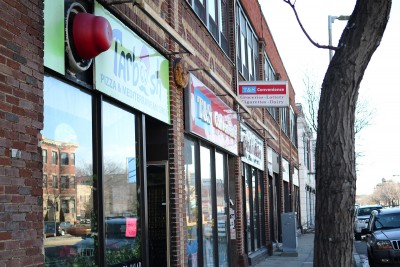
In a plan designed to signal the city’s commitment to entrepreneurship, Boston Mayor Martin Walsh announced Wednesday the City of Boston’s first ever “small business plan,” according to a Wednesday press release.
The press release stated that the plan aims to generate wealth throughout Boston and give people from every socioeconomic background a fair opportunity to develop strong businesses. The plan will establish a small business center, a hotline and a web portal to support entrepreneurs with access to citywide business supports.
“For Boston to continue to thrive and offer opportunities to all its residents, we need to make sure that our small businesses, which are a critical engine of Boston’s economy, are supported in the way that best meets their needs,” Walsh said in the release.
According to the release, the plan was developed in part by the Mayor’s Small Business Advisory Council, which includes 34 members of the small business community, including business owners in the industrial and startup industries and business owners who are women or people of color.
Critical to the success of this plan is much of the data that the city collected in a database called the State of Small Business in Boston, the release stated. The database reported that in Boston, small businesses are responsible for $15 billion in revenue and create approximately 170,000 jobs.
According to the release, the database also reports that 85 percent of Boston’s small businesses are considered to be micro-businesses, employing fewer than 10 employees and generating less than $500,000 in revenue. The database concluded that 44 percent of Boston’s employees in private, for-profit businesses work in small businesses.
Teresa Lynch, spokesperson for Mass Economics, one of the economic teams behind developing the policy in the “small business plan,” said small businesses are the cornerstone to local economies, despite the praise that is often heaped on large businesses.
“We think of the big companies — something like GE gets a lot of attention for coming to Boston, and that’s great, that’s really important,” Lynch said. “But small businesses often serve as suppliers to big businesses. They give people like you and me a place to have lunch. They also create a pipeline of businesses that will someday be the big businesses in Boston, so they’re very important for overall economic growth and job creation.”
Emma Walters, program manager at POP Allston, expressed excitement for the city to get up to speed with practices she believes POP Allston already exemplifies.
“I think what Mayor Walsh is talking about is already being practiced here at POP Allston,” Walters said. “We’re a pop-up contemporary community space that is part skate park, but also part incubator space for small businesses who otherwise can’t afford a brick-and-mortar location. That basically allows for a network of entrepreneurs who need a space and time to practice their business to kind of rely on each other for mentorship.”
Several Boston residents said they approve of the plan and hope it will bring support to small businesses.
Carlos Hernandez, 57, of East Boston, said he thinks Boston residents should spend their money at small businesses to aid growth.
“The government assistance is important, but it’s also very important to shop locally and support small businesses as citizens,” Hernandez said. “The efforts mean nothing if citizens do not support their local businesses.”
Emma Daniels, 25, of Allston, said she hopes the program will bring small businesses the assistance they need.
“In theory, it sounds like a good plan,” she said. “I just hope that they follow through and it will actually be helpful, not just wasted time and money.
William Connell, 56, of Back Bay, said he was surprised the plan wasn’t developed sooner.
“It’s about time,” he said. “This support for small businesses should have come long ago. It’s good to hear that those businesses finally have it, though.”





















































































































